21 Hours at Munich Blu-ray Movie
Home21 Hours at Munich Blu-ray Movie 
Kino Lorber | 1976 | 1 Movie, 2 Cuts | 101 min | Not rated | Dec 07, 2021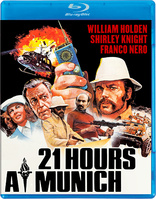
Movie rating
6.7 | / 10 |
Blu-ray rating
| Users | 0.0 | |
| Reviewer | 3.5 | |
| Overall | 3.5 |
Overview
21 Hours at Munich (1976)
A dramatization of the incident in 1972 when Palestinian terrorists broke into the Olympic compound in Munich and murdered 11 Israeli athletes.
Starring: William Holden, Shirley Knight (I), Franco Nero, Anthony Quayle, Richard BasehartDirector: William A. Graham
| Thriller | Uncertain |
| Sport | Uncertain |
| Drama | Uncertain |
| History | Uncertain |
Specifications
Video
Video codec: MPEG-4 AVC
Video resolution: 1080p
Aspect ratio: 1.78:1, 1.34:1
Original aspect ratio: 1.33:1
Audio
English: DTS-HD Master Audio 2.0 Mono (48kHz, 24-bit)
Subtitles
English SDH
Discs
Blu-ray Disc
Single disc (1 BD)
Playback
Region A (locked)
Review
Rating summary
| Movie | 3.0 | |
| Video | 4.0 | |
| Audio | 4.5 | |
| Extras | 1.5 | |
| Overall | 3.5 |
21 Hours at Munich Blu-ray Movie Review
Reviewed by Dr. Svet Atanasov December 18, 2021William A. Graham's "21 Hours at Munich" (1976) arrives on Blu-ray courtesy of Kino Lorber. The supplemental features on the disc include exclusive new audio commentary recorded by screenwriter and critic Gary Gerani and vintage trailer. In English, with optional English SDH subtitles for the main feature. Region-A "locked".
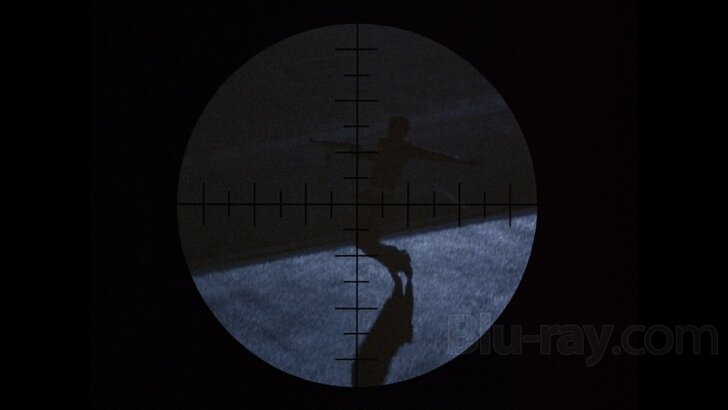
A combination of political naivety and sheer stupidity made the tragedy at the Olympic Village in Munich possible. It was the kind of astonishing failure that only political ideologues could not have foreseen, which of course were the very people West Germany had tasked to organize and promote the Olympic Games. So, as cynical as it may sound, everything that happened in the summer of 1972 made perfect sense.
William A. Grahamís film 21 Hours at Munich is based on Serge Groussardís novel The Blood of Israel, which reconstructs in great detail the events that led to the execution of the eleven members of the Israeli Olympic team. It is not the best film about the tragedy that you can see, but it is a decent time capsule that actually provides some interesting food for thought.
The film is shot and edited to resemble a documentary, which is probably the only way it could have looked legit at the time when it was greenlighted and screened. (It aired on TV in America and was screened theatrically overseas just a few years after the tragedy). In fact, Graham even uses bits of authentic footage from the games and a few speeches that were made before and after the tragedy.
The leader of the Arab terrorists is played by Franco Nero, who most of the time looks like a member of Baader-Meinhof or the Red Brigades rather than Black September. After he leads his group into the Olympic Village and the Israelis are taken hostage, a local security element, Anneliese Graes (Shirley Knight), engages him and he reluctantly reveals to her that he has been forced to act because he wants his brothers released from Israeli prison. The entire segment can make oneís head spin because it portrays the terrorist as a hopeless idealist with good intentions who is just just trying to right a terrible wrong. Nero was definitely not the right actor to play the part because neither his appearance nor his lines and mannerisms look convincing.
Chief of Police Manfred Schreiber, who was brought in to negotiate with the terrorists and figure out a way to get the Israelis released, is played by William Holden, who does not look terribly convincing either. Indeed, even during some of the most dramatic moments Holden speaks like a seasoned American diplomat who has plenty of time to craft a winning strategy without taking any risks. It is not how the real negotiations were held.
Later into the film, after a plan is introduced to allow the terrorists out of the Olympic Village, Anthony Quayle emerges as General Zvi Zamir and repeatedly questions Shcreiberís tactics. It is an unconvincing performance, too. It makes the general look oddly pushy, even slightly unbalanced at time, itching to spill blood before all other options are exhausted.
The filmís biggest weakness, however, is its incredibly safe and one-dimensional reconstruction of the drama. Admittedly, this isnít surprising because it was meant to be seen on TV, but the background information that would have helped viewers understand the true nature of the drama is missing. Oddly enough, this omission is what makes the film interesting to see because it forces the rational mind to ponder all sorts of different questions. How did the terrorists enter West Germany and reach the Olympic Village completely undetected? Was there are an insider assisting them on German soil? Who were the parties that funded their operation? Who were the parties that supplied the weapons for their operation?
In the old days, the official truth about the terrorist operation in Munich was that it was entirely organic, which of course only the most naÔve thought made perfect sense. Why? Because during the Cold War era all major terrorist operations in the West were either directly coordinated by the KGB or via friendly proxies, like Stasi and KDS. It is well-known that far-left groups like Black September, Baader-Meinhof, the Red Brigades, and even the one that the notorious Carlos ran for decades routinely received ideological and logistical support from the KGB, so it would have been utterly uncharacteristic to have the operation in Munich staged without an explicit permission issued by the Kremlin.
*The film was shot on locations in Munich where the real drama unfolded. On this release, it is presented in two aspect ratios, 1.33:1 and 1.78:1, which were used for the U.S. broadcast on ABC and the international theatrical exhibitions, respectively.
21 Hours at Munich Blu-ray Movie, Video Quality 
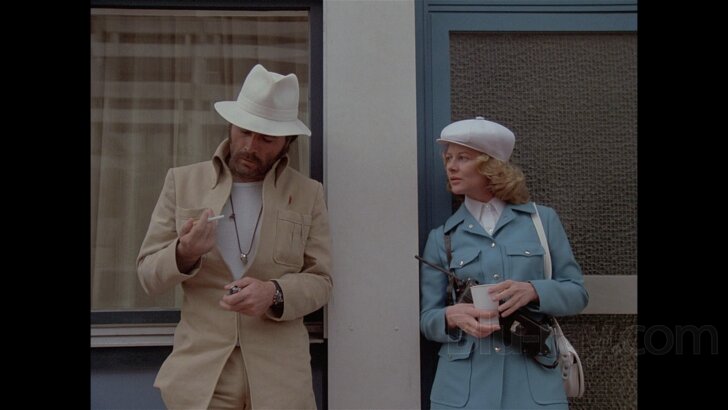
Presented in aspect ratios of 1.34:1 and 1.78:1, encoded with MPEG-4 and granted a 1080p transfer, 21 Hours at Munich arrives on Blu-ray courtesy of Kino Lorber.
At some point this film was obviously remastered by MGM because it looks very healthy. Yes, there are a couple of minor white specks and blemishes in a few areas, but my point is that this master isn't recycled from the early days of DVD. In fact, it very much looks on par with some of the more recent 2K masters for TV content that the folks from Kino Lorber have used for select catalog releases.
I viewed the film in 1.33:1 ratio and thought that it look lovely. Depth and clarity for instance, range from good to very good and occasionally even excellent. No, this does not mean that there are some drastic fluctuations you should be concerned with. Rather, there are select darker areas where I believe some extremely light black crush sneaks in. Density levels are very good, and if you can upscale to 4K, you will get some pretty impressive visuals on your TV or projection screen. There are no traces of problematic digital corrections. Grain could look a bit healthier, but I am fine with the current exposure. Color balance is convincing. There are a few darker areas where darker nuances could have been managed slightly better, but I think that everything looks good. There are no stability issues. All in all, even though there is room for some cosmetic tweaks, I was very pleased with the technical presentation of 21 Hours at Munich. My score is 4.25/5.00. (Note: This is a Region-A "locked" Blu-ray release. Therefore, you must have a native Region-A or Region-Free player in order to access its content).
21 Hours at Munich Blu-ray Movie, Audio Quality 
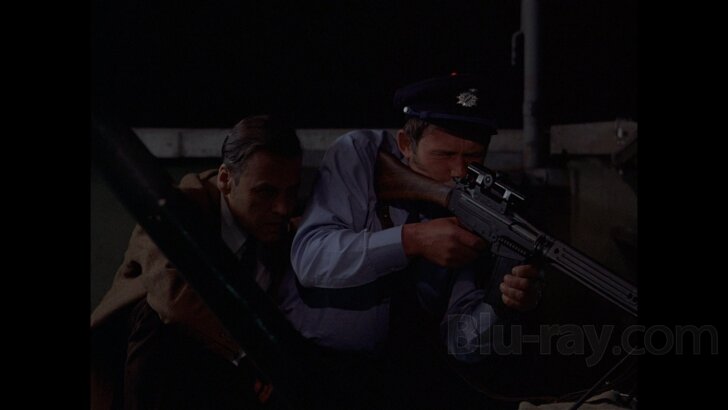
There is only one standard audio track on this Blu-ray release: English DTS-HD Master Audio 2.0. Optional English SDH subtitles are provided for the main feature.
The audio is stable and easy to follow. It could be slightly uneven during a few mass scenes, but it is easy to tell that this is an inherited limitation. Clarity, sharpness, and depth, but again you have to keep in mind that this is an older film with typical limitations. Is there any room for improvements? With older films I usually take a closer look at the upper register where signs of ageing are usually present, and on this lossless track I did not encounter any obvious issues. Perhaps there is room for some gentle rebalancing work, but I think that the improvement will be insignificant. There are no encoding anomalies to report.
21 Hours at Munich Blu-ray Movie, Special Features and Extras 
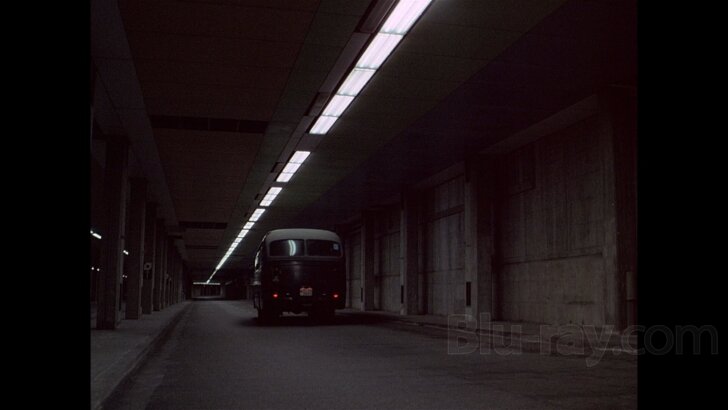
- Trailer - vintage trailer for 21 Hours at Munich. In English, not subtitled. (3 min).
- Commentary - an exclusive new audio commentary recorded by screenwriter and critic Gary Gerani.
21 Hours at Munich Blu-ray Movie, Overall Score and Recommendation 
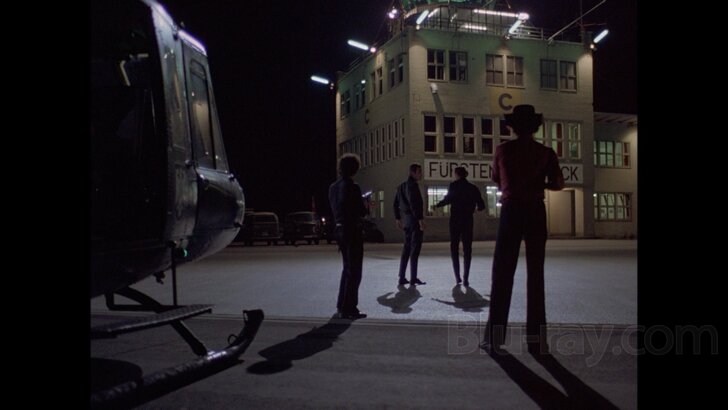
The list of reasons why 21 Hours at Munich cannot be taken seriously by anyone with a good grasp of history is so long that it is actually easier to point out a few of the reasons why the film is still worth seeing. I would like to highlight two such reasons. First, it is a fascinating time capsule because it visits some of the actual locations where the real drama unfolded, which makes the failure of the local authorities to foresee the potential for serious trouble even more infuriating. Second, the film's careful omission of key facts and relationships reveals plenty about the era it came from and the media's ability to shape up the truth, which makes it thought-provoking in an entirely new and quite refreshing way. This happens to be the main reason why despite all of its flaws I enjoyed it a lot. Kino Lorber's release of 21 Hours at Munich is sourced from a very nice organic master that was supplied by MGM. RECOMMENDED.
Similar titles
Similar titles you might also like

Munich
2005

Ransom
Import | The Terrorists
1974

The Hindenburg
1975

Twilight's Last Gleaming
Nuclear Countdown
1977

The Keeping Room
2014

Julius Caesar
1970

Airport 4K
1970

Cry Macho
2021

The Domino Principle
The Domino Killings
1977

The Gentle Gunman 4K
Indicator Series | Limited Edition
1952

The Park Is Mine
1986

Return from the Ashes
1965

Beirut
2018

Dark Winds: Season 3
2024

The War Lord
1965

Rampage 4K
1987

No Highway in the Sky
1951

The Little Drummer Girl
Warner Archive Collection
1984

The Show
2017

The Wilby Conspiracy
1975